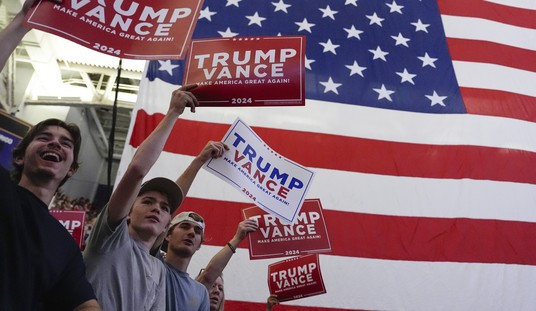Controversy swirls around the nomination of Stephen Moore to the Fed. Full disclosure, in the tiny word of Supply-Side economics Moore’s an old friend, a friendly rival, and occasional professional collaborator of mine.
President Trump’s announced desire to nominate Moore raises questions of greater importance than merely of Moore’s fate or even the fate of the Fed. Moore’s nomination is, by far, the most important to date of the Trump administration. Let me reveal why.
The Mandarin-class’s mass hysteria over President Trump’s nomination of Moore resembles the recoil of a vampire from a crucifix more than it does a mere policy dispute. That makes this moment -- conservatives should insist on it -- a defining moment in 21st century politics.
The Federal Reserve Board and its opulent staff is housed in a grand Art Deco palace on Constitution Avenue. The Fed is the most powerful central bank in the world. As such it is as much a throwback as is the architecture of its headquarters.
The Fed remains one of the last holdouts of central planning. Central planning is an intellectual artifact that has been thoroughly discredited wherever tried. Yet the idea of central planning remains bitterly clung-to if only in Pyongyang and within the progressive ramparts of America’s democratic socialists. Therein hangs a tale.
As those who are out to smear Moore’s good name well know he has overshot his quota of venial sins. However, the president’s nomination of him to the Fed is not about a candidacy for sainthood. It’s about something much more important.
Recommended
The hysteria Moore’s nomination has evoked represents a clash between the elitism exemplified by the Fed and the populism exemplified by Stephen Moore. The fight between populism and elitism is, arguably, the central political fight of our era.
Public intellectual John Ralston Saul introduces his searing examination of the tragedy of modernity, Voltaire’s Bastards, with this observation:
“Elites quite naturally define as the most important and admired qualities for a citizen those on which they themselves have concentrated. … The weakness of rationally based power can be seen in the way it views criticism as an even more negative force than a medieval king might have done. … What is it which so frightens these elites? Language – not money or force – provides legitimacy.
“So long as military, political, religious or financial systems do not control language, the public’s imagination can move about freely with its own ideas. Uncontrolled words are consistently more dangerous to established authority than armed forces...
“There is nothing particularly original about breaking down the intellectual, political, social and emotional walls behind which language has been imprisoned, freeing it, than watching while the poor thing is recaptured and locked up again. That process has been repeated endlessly throughout history.
“The wordsmiths who serve our imagination are always devoted to communication. Clarity is always their method. Universality is their aim. The wordsmiths who serve established power, on the other hand, are always devoted to obscurity. They castrate the public imagination by subjecting language to a complexity which renders it private. Elitism is always their aim.”
Moore is one of “the wordsmiths who serve our imagination.” He is not one of “the wordsmiths who serve established power.” What are the implications?
In 1992, Jeffrey Bell’s cult classic Populism and Elitism: politics in the age of equality nearly prophesied the coming of President Trump. Bell also anticipated the microcosmic political apocalypse embodied in Trump’s nomination of Moore and the opposition it evoked.
The iconic political journalist Fred Barnes called Populism and Elitism the most important political book of its year. I would argue that it subsequently has proved the most important political book of our era (except for Voltaire’s Bastards).
Matt Continetti, a non-elitist member of the political elite, writing in the National Reviewafter Bell’s last year’s climbing the stairway to Heaven, ably sums up Bell’s core insight:
For most of human history, elites competed among themselves for power. With the coming of American democracy, the struggle occurred not only between elites but also between elites and the populace. Jeff identified a tradition of public resistance to the encroaching control of elites that runs from Thomas Jefferson through Andrew Jackson and Ronald Reagan and beyond. (We’ll get to you-know-who in a second.) ‘Populism,’ Jeff wrote, ‘is optimism about people’s ability to make decisions about their lives. Elitism is optimism about the decision-making ability of one or more elites, acting on behalf of other people.’”
Continetti then thoughtfully analyzed the populism of “you-know-who,” Donald Trump. The Trump White House’s decision whether to pull out all the stops -- and pour out its political capital in the cause of Moore’s confirmation – may be decisive as to how history treats this presidency.
This is a defining moment.
If Trump chooses to withhold or withdraw Moore’s name from nomination Trump is more likely to prove a mere interregnum. A balk could cause the Trump presidency to become a mere footnote to history, a moment in which populism flickered and was gone.
If Trump, rather, uses his formidable political muscle to insist on the confirmation of Stephen Moore such determination could be the defining moment in the beginning of a new, secular, populist era. How so?
Stephen Moore, even considering his (well-publicized by his elitist enemies) propensity to flit between the lines of genius and madness, is a great populist. Moore’s populism is the real trigger of the horror of the elitists who dominate our politics.
Donald Trump’s historical stature as a populist and as a president may hang from the thread of Moore’s confirmation battle. That said, the confirmation of Stephen Moore is a hill worth dying upon. Soon we shall discover whether this White House rises to the occasion and to the call of history.























Join the conversation as a VIP Member